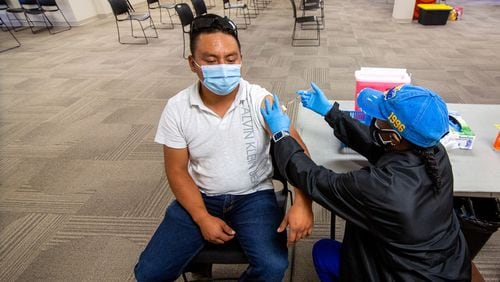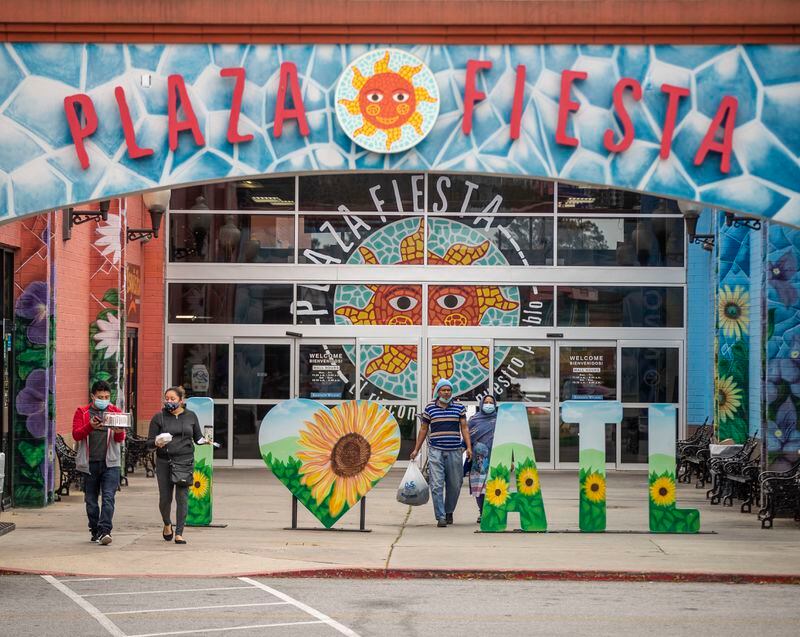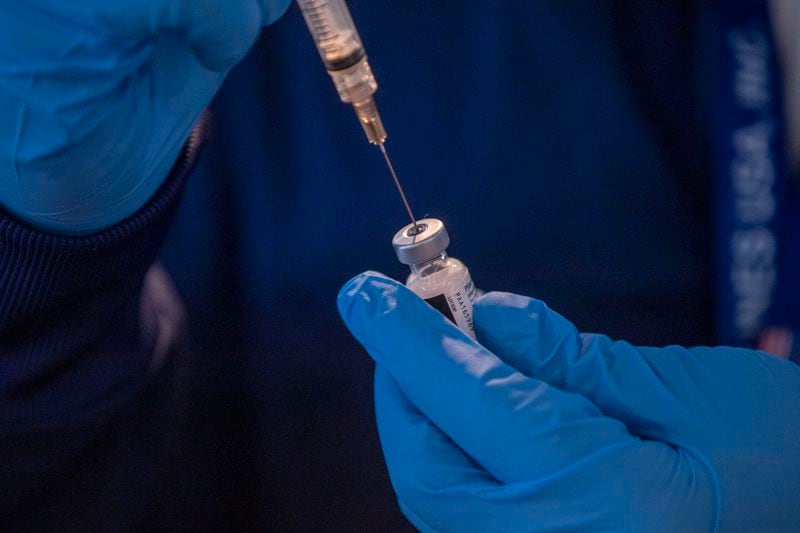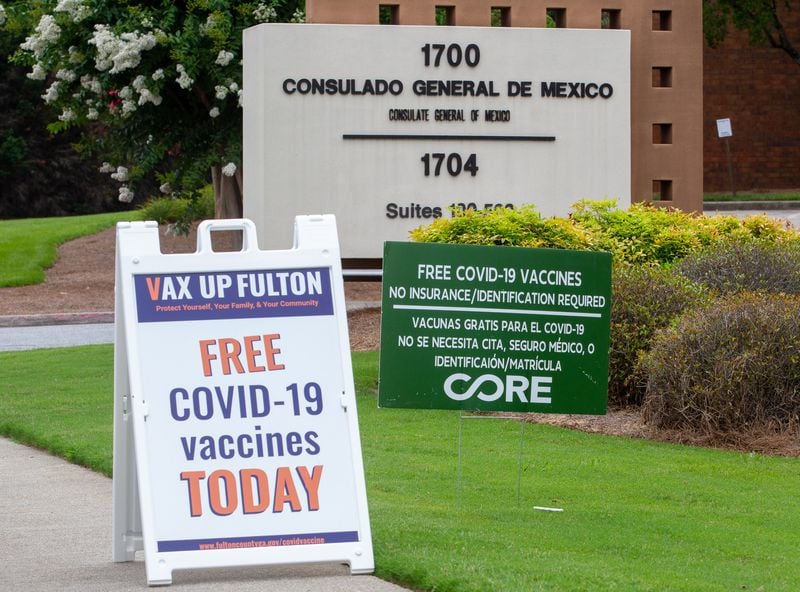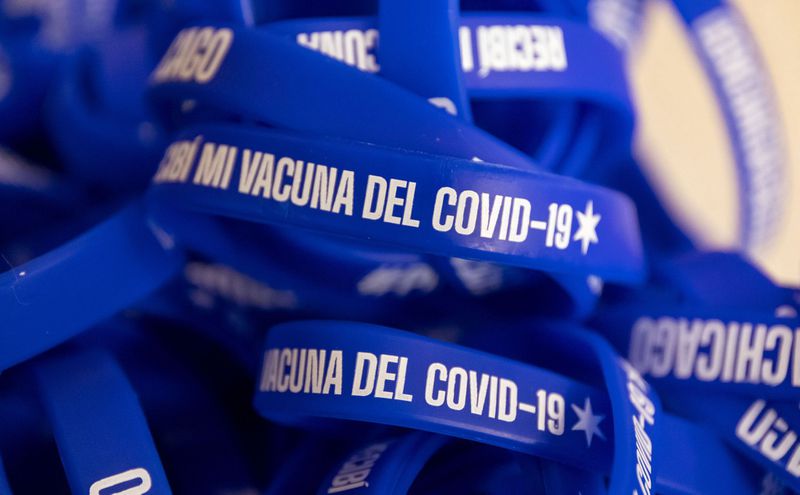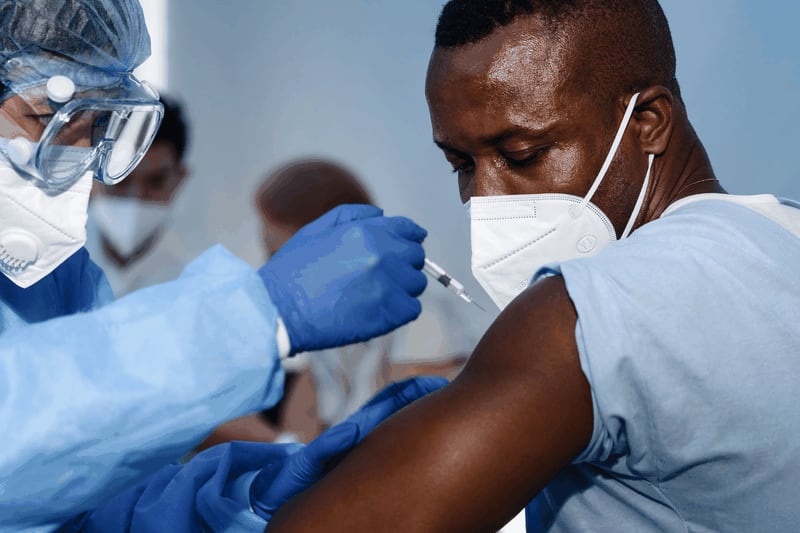Julio, an unauthorized immigrant from El Salvador, received his vaccine on a Friday in mid-July. The jab, by his own account, came later than he would have hoped.
“I always had the intention of getting vaccinated,” he said in Spanish. “I was really keeping an eye on it ... Finally, the time came to get my shot.”
Julio’s grueling work schedule, tied to a physically demanding job in construction, made it difficult to find the time to both get the vaccine and recover from possible side effects before being due for his next shift.
“In order to do my job, you need to feel well. It’s very intense,” said Julio, who requested his full name not be used because of his immigration status.
Community advocates working to boost vaccination rates among Atlanta’s immigrant communities say Julio’s story is fairly representative of the broader, unvaccinated population they are trying to whittle down. Julio believed in and wanted the vaccine — all of his U.S.-based relatives, he noted with pride, had been vaccinated already. It also weighed on him that many of his loved ones back home want the shot too but aren’t able to get it because of El Salvador’s slower vaccine rollout.
Julio received his vaccine at a clinic in Plaza Fiesta, the DeKalb County Latin mall. He had heard about the vaccination site from friends, who assured him vaccines were given out free of charge. It helped, he said, that he was already very familiar with the mall.
Credit: Alyssa Pointer / Alyssa.Pointer@ajc.com
Credit: Alyssa Pointer / Alyssa.Pointer@ajc.com
Starting in May, CORE (Community Organized Relief Effort) has held a mobile vaccination site at Plaza Fiesta every Friday, part of the nonprofit’s efforts to inoculate immigrant communities, who are among those that have been hardest hit by the COVID-19 pandemic in the state.
“Plaza Fiesta is such a staple piece of Buford Highway,” said Jennifer Tellez, with CORE. “It’s accessible to people. It’s not out of their way.”
With vaccination rates stagnating across much of the state, Tellez says CORE’s Plaza Fiesta outpost is bucking the trend, and drawing more and more people each week through word-of-mouth. It’s one of many mobile vaccination sites regularly popping up across metro Atlanta’s immigrant enclaves, as nonprofits bring vaccines to ethnic churches, foreign consulates, popular markets (from Nam Dae Mun in Duluth to La Vaquita in Pendergrass), and inside work sites with big immigrant employee bases. A two-day vaccination event in June at tortilla producer Olé Mexican Foods in Norcross netted 250 new vaccinations, organizers reported.
The goal, advocates say, is to make both vaccinations and culturally competent information about vaccines available in the places that immigrants already frequent. That’s a strategy that, according to health experts, should define this current, toughest phase of the state’s flagging vaccination campaign.
“We need to make it so easy to get the shots that people have no excuse for being unvaccinated,” said Dr. Laila Eugenia Woc-Colburn, an infectious disease specialist at Emory University Hospital, and an immigrant from Guatemala. “The more we remove the accessibility barrier, the more vaccines we will be able to give out.”
Genesis Castro helps coordinate the Latino Community Fund’s COVID-19 response. She says vaccine outreach to immigrant communities often needs to compensate for immigrants’ lack of access to, and trust in, the health care system.
“Especially living in Georgia, it can unfortunately be really hard for people who don’t speak English, who don’t usually go to the doctor all the time to find out where to get vaccinated,” she said.
Credit: Alyssa Pointer / Alyssa.Pointer@ajc.com
Credit: Alyssa Pointer / Alyssa.Pointer@ajc.com
To a certain extent, that work seems to be paying off. According to an AJC data analysis of vaccination rates across Georgia census tracts, there is a positive relationship between foreign-born population totals and vaccination rates, even after accounting for other factors such as population over age 65 and the percent of people with college degrees, the two factors that are most predictive of vaccination rates.
That means the more immigrants a neighborhood has, the more vaccinated its people tend to be. It’s a trend that holds up across different places of origin, from Central and South Americans to Europeans and Asians, who make up about 4% of Georgia’s population, but over 6.5 percent of the state’s vaccine recipients (”There isn’t too big of a push to get Asian Americans vaccinated because most of them have already done it,” said Xavier Kim, managing director of the Asian American Resource Center). Instead of falling behind in the vaccination campaign, immigrants might be inching ahead.
‘You just need to be here’
In May, the Latino Community Fund, in partnership with the Community Foundation for Greater Atlanta and the Metro Atlanta Chamber of Commerce, compiled a report with tips on how best to promote vaccination events to immigrant communities. The report recommends avoiding phrases like “vaccination event for immigrants” (the word “immigrants,” it is noted, can “raise a flag”). Campaigns targeting people from Latin America should also refrain from using words like “Latinx” — which Spanish-speakers do not use — and opt instead for language like “evento de vacunación para la comunidad,” or “vaccination event for the community.”
“If you are trying to target immigrants, you need to speak to them in a way that makes sense for them,” Castro said.
Both CORE and the Latino Community Fund say it’s necessary to repeatedly stress that vaccines are free, and that proof of insurance isn’t required. Confusion on those points has been cited as a reason keeping many from getting the shot.
Information inside vaccination sites, advocates say, should also come in different languages.
For Vanesa Sarazua, founder and executive director of Hispanic Alliance Georgia, a nonprofit based in Gainesville that has been organizing vaccine clinics, the most important action to take is to repeatedly reassure immigrant communities that IDs aren’t required to get the shot.
“I know that when some immigrants come and they get asked for an ID, they can get nervous,” said Frida Garcia, a site leader with CORE, at a vaccination clinic at the Latin American Association in June.
At that clinic, attendees who could not, or did not want to, present IDs were given the option of writing down their full name and dates of birth on purple sticky notes.
“You don’t need any ID. You just need to be here,” Garcia said.
Consistency is key
To boost vaccination rates among communities with higher barriers of access to the vaccine, advocates say it’s crucial for vaccination clinics to be organized in culturally relevant places not just once, but many times.
“Especially for immigrants and people who have a hesitancy to trust institutions, it’s important for them to see consistency,” Castro said. “It’s important for them to see the same faces.”
Credit: Steve Schaefer
Credit: Steve Schaefer
The International Rescue Committee held its first mobile vaccination site in Clarkston — one of the largest refugee resettlement communities in the country — in January. In cooperation with CORE and the DeKalb County Board of Health, the IRC has helped give out over 7,000 doses since then. At the helm of the IRC’s COVID response is Dr. Omar Aziz, from Iraq, who leads a team of 20 associates, all from immigrant backgrounds.
Those running the IRC’s vaccine operation “represent the community they are serving,” IRC spokesperson Fiona Freeman wrote in an email. “Sometimes, our team members would leave their apartment and walk to work at our mobile site in the same apartment complex.”
Consistency is the cornerstone of the Mexican Consulate’s vaccination clinic, which operates every Wednesday, Thursday and Friday out of its “ventanilla de salud,” or “health counter.”
Since March, nearly 5,000 people had been vaccinated at the consulate, according to Dianne Roman, the ventanilla’s coordinator.
“Here at the consulate, we take advantage of the fact that there are many people coming here to get their passports, their documents,” said Roman. “I also go up to people and sit down with them one-on-one. ‘Tell me, what are your questions about the vaccine? What are your fears?’ I believe that really helps.”
Aside from her interactions with people physically present at the consulate, Roman also makes herself available to answer questions or clear up misconceptions on the phone and on social media.
“People have access all the time to someone that can explain things about the vaccine,” said Roman. “We try to be omnipresent.”
Speaking the same language
On a recent Sunday, as attendees of the noontime Mass spilled out of San Felipe de Jesús Catholic Church, they were intercepted by a staffer from the Latino Community Fund.
“Good afternoon, we’re offering the Pfizer vaccine to anyone who’s interested,” Jose Luis Calderon told churchgoers in Spanish. “No appointments or IDs are needed.”
Credit: TNS
Credit: TNS
The Latino Community Fund and CORE had been administering vaccines at San Felipe de Jesús, a Forest Park church with a congregation in the thousands, since 9 a.m. For the second time that day, Calderon was attempting to steer what he called the post-Mass “rush hour” in the direction of a large white tent in the church parking lot where people were being registered for either their first or second doses.
The vaccination site at San Felipe de Jesús tapped two bilingual Emory Healthcare doctors, both volunteers to give the shots and answer people’s questions.
“If you’re able to speak the language, it makes people more comfortable. They feel like they are able to talk more freely and ask all the questions they have,” said Dr. Ingrid Pinzon, an internist from Colombia. “In their place, I’d feel more comfortable too. When you are dealing with health care, you have to have trust. And there’s always more trust when you are speaking the same language.”
Pinzon and her partner, Dr. Martha Aguilar, a family medicine physician from Bolivia, say the bulk of the questions they receive at pop-up clinics have centered on the nature and severity of post-vaccination side effects.
It’s a topic that regularly comes up in the clinics that Sarazua helps organize in Gainesville, as well as in the conversations she has held with workers outside Hall County poultry plants, which she has visited to raise awareness of vaccine safety.
“People are afraid of what is going to happen after they get the vaccine as far as how ill they will feel, and if they will have to miss work due to the side effects. And they just cannot miss work. They can’t afford it,” Sarazua said. “Even just one day of missing work for people who live day to day and sometimes have to decide whether to eat or to pay rent is a big deal.”
To get its message out, in the spring, the IRC named three “COVID champions”— all of whom are in their 20s and have studied either nursing or public health — to disseminate information about the vaccine in their communities, with a particular focus placed on refugee youth. Among them, the three-person team speaks Burmese, Tigrinya, Amharic, Nepali and Hindi.
Joining the COVID champions soon in Clarkston will be a team of “community navigators,” funded by a $500,000 CDC grant and trained by Georgia State University’s Prevention Research Center. Community navigators will hail from the Burmese, Congolese, Afghan, Somali, Middle East and African American communities, and will be engaged in vaccine outreach at least through May 2022.
Navigators will be trained to “be respectful,” said Dr. Michael Eriksen, Regents’ Professor in Georgia State’s School of Public Health. “Not in any way demand that people get vaccinated, but simply reassure them that the vaccine is the right thing to do.”
He added: “We are really looking at this quite urgently. Just this week, the increase (in COVID cases in Georgia) has been startling. Time is of the essence.”
Data Specialist Nick Thieme and AJC reporter Paradise Afshar contributed to this report.
Lautaro Grinspan is a Report for America corps member covering metro Atlanta’s immigrant communities.
How we got the story
An AJC analysis of vaccination rates in Georgia by census tract shows that there are strong links between the percentage of college-educated residents and residents over the age of 65. After accounting for these and other factors, the analysis found that a census tract with a foreign-born population of 20% will have a vaccination rate 7% higher than a census tract with a foreign-born population of 0%. Such a relationship may be specific to Georgia, however, given conflicting evidence from other states.
For the average Georgia census tract the foreign-born population of just under 9%, almost 35% have had one vaccine dose and almost 32% have had both doses.
The AJC found these connections by using a particular kind of statistical model commonly used to analyze percentage data, like the percent of a census tract that has received a full dose of the COVID vaccine.
Beta regression, as this model is known, however, assumes that a variable’s effect is the same at all levels of that variable. For example, a standard beta regression requires that increasing the percent of college-educated residents from 0% to 10% affects the vaccination rate the same as increasing it from 70% to 80%. That can be hard to justify. The AJC used what could be considered a variant of beta regression that allows the effect to change depending on the value of the variable, allowing for either increasing or diminishing returns as the variable increases
- Data specialist Nick Thieme
About the Author
